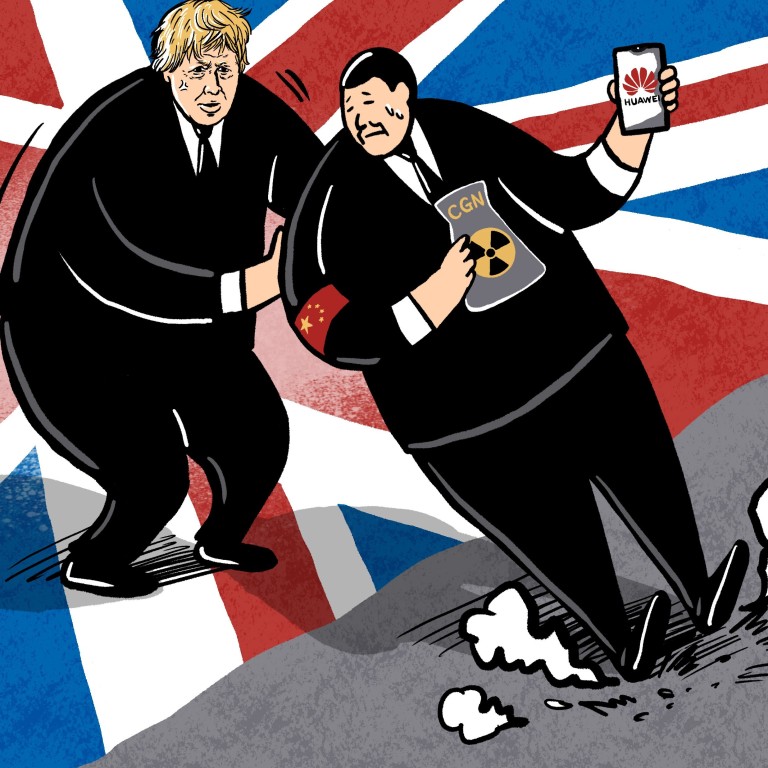
Will Huawei, Hong Kong and China backlash scupper Britain’s post-Brexit free trade dreams?
- A ‘golden era’ of relations between Beijing and London is over, with British politicians across the board calling for a redressing of ties
- Rows have flared over Huawei, Hong Kong and nuclear power
When business grandee Gerry Grimstone was appointed as Britain’s investment minister in March, Chinese diplomats were confident he would help steer economic ties towards a course they desired.
Just three months earlier, Grimstone, the former chairman of Barclays Bank and Heng An Standard Life, had been a star guest at an event hosted by the Chinese embassy in London to celebrate the 20th anniversary of the handover of Macau from Portugal.
Grimstone used the event to slam Hongkongers who were protesting against the government’s proposed extradition bill, which could have seen suspects sent over the border to mainland China for prosecution.
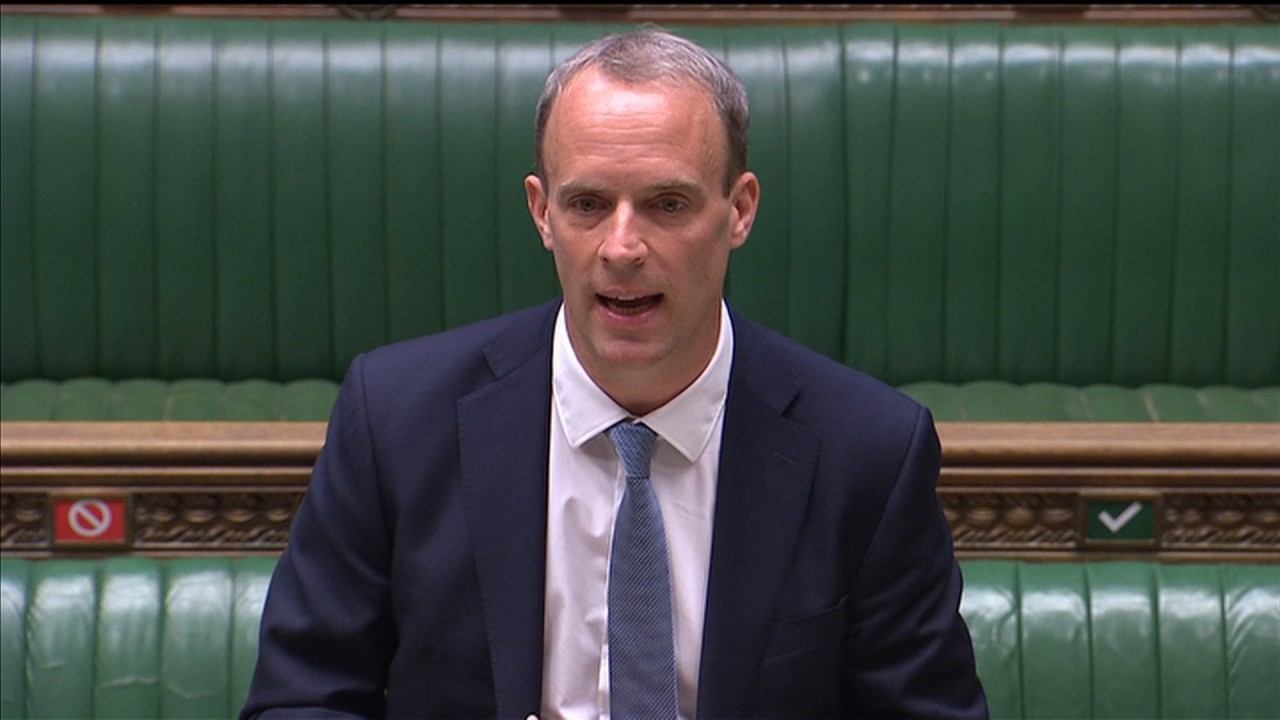
00:51
Britain suspends Hong Kong extradition treaty over national security law
“The social problems that Hong Kong has faced over the last six months are destroying the credibility of Hong Kong. Hong Kong people should ask themselves a question: What is Hong Kong without China?” he said.
“Some external people do not understand that their interventions are only making matters worse,” continued Grimstone, who could have had no idea what the coming months had in store.
The British government Grimstone was about to serve was among those making unprecedented interventions, turning a “golden era” for British and Chinese relations into the period of greatest uncertainty for decades.
We have a strong and constructive relationship with China … but this relationship does not come at any price
Johnson’s post-Brexit blueprint for a “Global Britain” already looked fragile, with talks over a trade deal with the United States officially postponed and trade negotiations with the European Union fraught. Now, Britain’s hopes of clinching a free-trade agreement with China look to be on thin ice too.
A British government spokesman, asked about investment minister Grimstone’s previous comments on Hong Kong, said: “The government’s approach to China remains clear-eyed and rooted in our values and interests. We have a strong and constructive relationship with China … but this relationship does not come at any price.
“It’s always been the case that where we have concerns we raise them and where we need to intervene we will.”
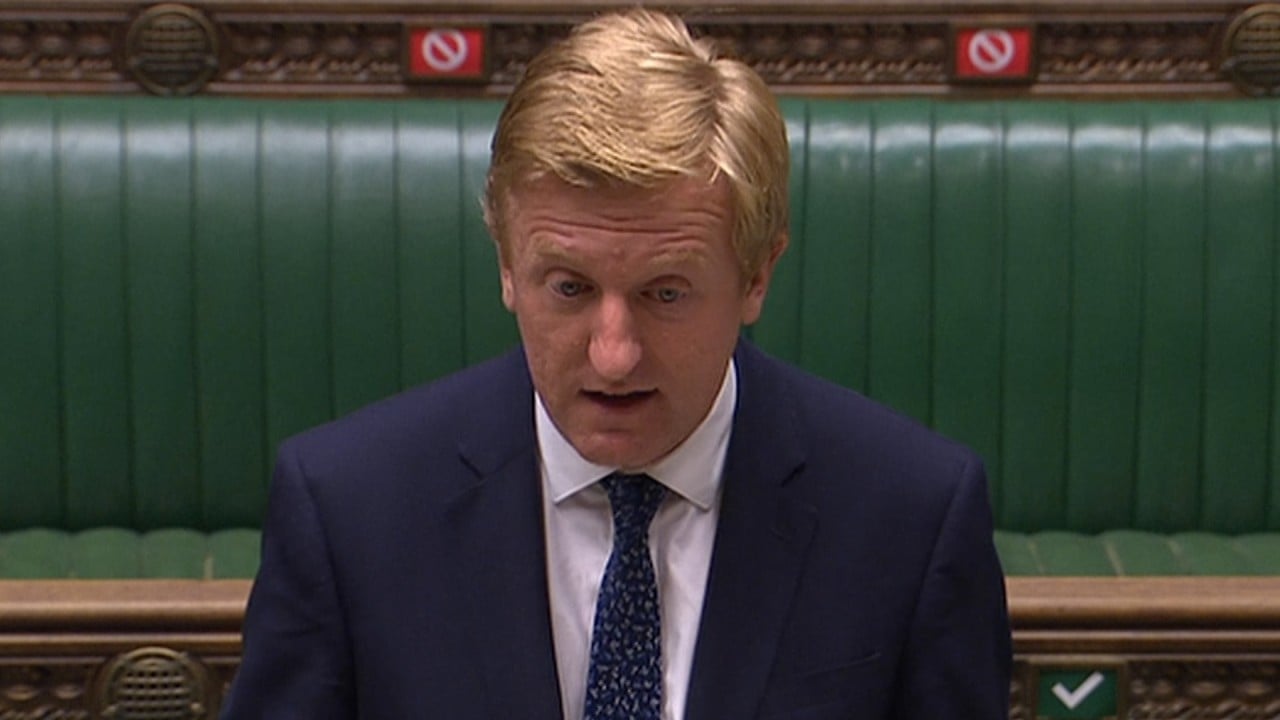
02:27
UK bans Huawei from 5G network after US sanctions
They have also set their sights on another battleground: nuclear power. The state-run China General Nuclear (CGN) is involved in three British nuclear power projects, all jointly funded with French investment.
MPs are calling on Westminster to block the project considered to be most controversial: Bradwell nuclear station, where majority shareholder CGN is planning to run Chinese-made nuclear reactors just 60km east of London. According to CGN's top man in Britain, Zheng Dongshan, the project is a showcase of China’s Belt and Road Initiative, its plan to grow global trade.
“If we don’t want the UK taxpayer to contribute to the strength of the Chinese military, or UK-based technology to mysteriously end up in Beijing, we need to act swiftly and decisively,” Conservative MP Bernard Jenkin wrote this month, urging the British government to have a controlling stake in critical infrastructure projects.
We want to be your friend. We want to be your partner. But if you want to make China a hostile country, you will have to bear the consequences
The government’s approach to China’s nuclear power presence could mirror its strategy on Huawei. Instead of making a wholesale realignment of its China strategy, Johnson’s government cited American executive orders against Huawei in banning the Chinese telecommunications giant.
Last year, the US Department of Commerce barred American firms from selling products to CGN, while US officials have previously warned Britain to ditch the company, citing evidence that it had transferred technology from civilian to military applications.
But Westminster also needs to weigh the threat of retaliation against British businesses, with Chinese officials floating this suggestion soon after the Huawei decision was confirmed.
“We want to be your friend. We want to be your partner. But if you want to make China a hostile country, you will have to bear the consequences,” China’s ambassador to London, Liu Xiaoming, said after the announcement.
Vulnerable parties may include Scotch whisky distillers, a growing sector in China, and carmakers like Jaguar Land Rover, which makes a fifth of its global revenue in China.
Chinese state media has also taken aim at HSBC, the UK-headquartered bank which is a fixture in China-related headlines these days, and which makes two-thirds of its profits in China and Hong Kong.
British businesses in China are already experiencing the same challenges as their American and continental counterparts, which have reported “promise fatigue” at the glacial pace at which the Chinese economy is opening up. In its 2020 position paper, the British Chamber of Commerce in China said that while “high-level reforms have been announced by the central government, many businesses report seeing little material change to their operations”.
“The overbearing presence of state-owned enterprises throughout the Chinese economy stifles competition and discourages foreign investment, thereby limiting the extent to which businesses will bring their technology and capabilities into China,” the paper continued, in language echoing that of other Western lobby groups in China.
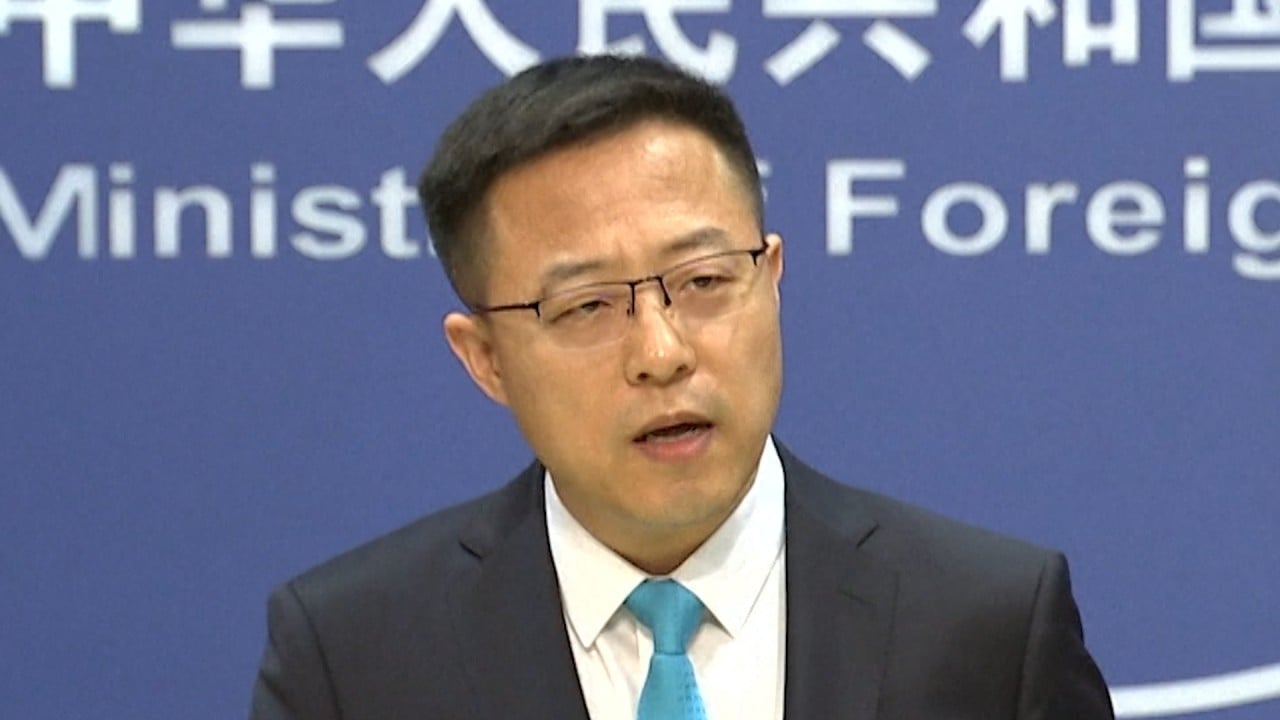
00:56
China condemns UK for citizenship offer to BN(O) passport holders in Hong Kong
Despite this, British businesses were still hopeful that the government would try and launch free trade talks with its second biggest non-European trading partner, with which bilateral trade exceeded US$102.5 billion last year.
Will Miller, policy analyst at the British Chamber in China, acknowledged that “this is certainly a challenging time in the UK-China relationship”, but said that a free-trade deal “would go some way to addressing many of the challenges British businesses face in China, such as a misalignment of standards, lack of recognition of licences and qualifications and difficult customs duties and procedures”.
But across the West, the lack of progression towards such commercial targets has made the business lobby – previously staunch advocates of strong ties with China – less reliable allies for Beijing.
“Is that a price worth paying? Well, yes it is a price worth paying because it’s about the long-term survival of democracy and Western values,” Armstrong said.
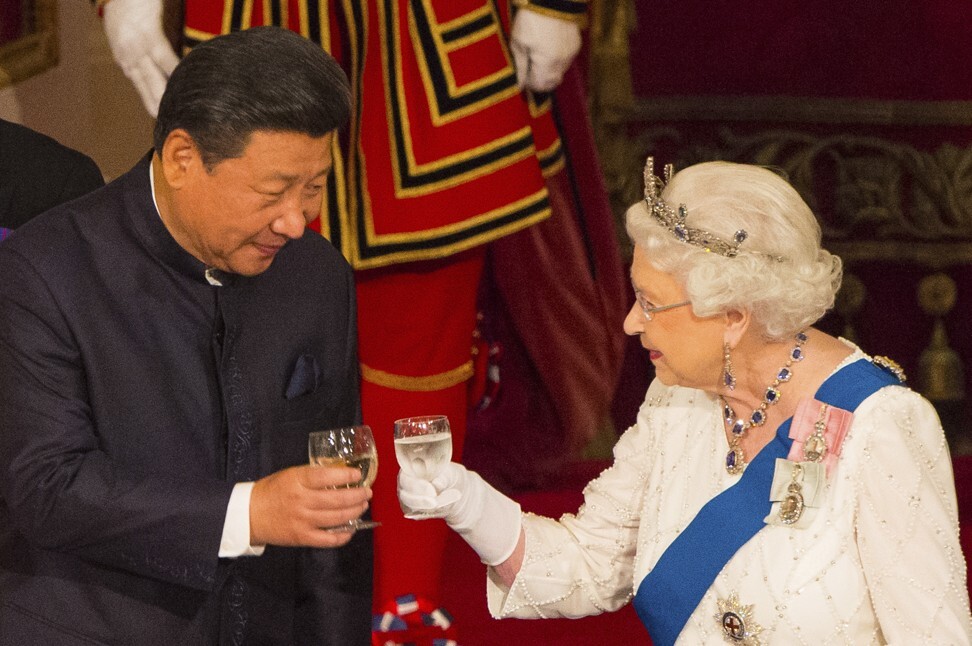
This is a far cry from Britain’s then international trade secretary Liam Fox and Chinese commerce minister Zhong Shan agreeing to “actively explore the possibility of discussing a top notch free trade agreement between the two sides after Brexit”, back in 2018.
It also feels like light years away from 2015, when Chinese President Xi Jinping shared a horse-drawn carriage with the queen in London and supped ale with then prime minister David Cameron in a Buckinghamshire pub, kick-starting the so-called “golden era” under the auspices of then chancellor George Osborne.
“Osborne’s thinking was based on the geopolitical shift. He saw the 21st century as the Asian century – that means to some extent the China century. The plan was to try to make Britain China’s best friend in the West,” said Nick Timothy, who was chief of staff to Cameron’s successor as prime minister, Theresa May.
Osborne and Cameron stepped down after the vote to leave the European Union in 2016, and Timothy says May was immediately wary of Britain’s China policy. “Theresa had long been sceptical of China when she was home secretary,” Timothy told the South China Morning Post, citing her initial refusal to endorse the Hinkley Point nuclear plant part-funded by CGN – before the government realised it would be too late to walk back.
What the prime minister needs to understand is that the China he fell in love with is no longer the China that exists
The Johnson government’s about-turn may have surprised Chinese diplomats who were convinced of the Conservative Party’s business-minded approach to diplomacy, but Timothy points to the coronavirus as a turning point.
“The pandemic has changed everything, not just the fact that the virus started in China, but also because of the way China has behaved ever since – sharing of information, manipulation of the World Health Organisation, disinformation in the West, crash of Hong Kong,” said the former aide.
Even Johnson himself, who tried to reassure Beijing of his enduring love for China amid rising diplomatic tensions, faced calls to act tough on China during recent Zoom meetings with the public, a Whitehall source said.
“What the prime minister needs to understand is that the China he fell in love with is no longer the China that exists,” added Armstrong.
The first in our series analysed the negotiating positions, sticking points and geopolitical tensions, while the second part looked at how the negotiations are viewed in political circles within China. The third part looked at the political machinations in the European Union and how the bloc might react to a failure in investment talks with China, while the fourth part looked at how the United States factors into the EU-China relationship, as Washington moves towards a frenzied election season.






